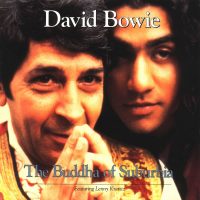 Written by: David Bowie
Written by: David Bowie
Recorded: June-September 1993
Producers: David Bowie, David Richards
Released: 8 November 1993
Available on:
The Buddha Of Suburbia
Nothing Has Changed
Personnel
Contents
Erdal Kızılçay: keyboards, synthesizer, guitar
Lenny Kravitz, Rob Clydesdale: guitar
Paul Davidson: bass guitar
Danny ‘Isaac’ Prevost: drums
The title track of David Bowie’s second album of 1993 was a nostalgic look back at growing up in south London in the 1950s, containing musical and lyrical references to his early Seventies work.
The album was named after Hanif Kureishi bestselling novel, published in 1990, which was adapted for television by the BBC in 1993. The protagonist, Karim, was a Briton of Asian descent living in Bromley, Greater London, in the 1970s.
Music is integral to Kureishi’s semi-autobiographical work, which portrays a young mixed-race man’s struggles with racism, sexual experimentation, shifting fashions and trends, and class barriers. Kureishi, like Bowie, was brought up in Bromley and attended Bromley Tech, although Bowie was seven years his senior.
The song ‘Buddha Of Suburbia’ was used in the titles for the BBC series, and also appeared in promotional material.
Earlier in 1993, around the time of Black Tie White Noise, the New Musical Express had conducted a joint interview with Bowie and Suede’s frontman Brett Anderson. Suede were Bowie obsessives, whose image owed much to their idol’s ’70s glam stylings and sexual ambiguity.
Lots of the things from that period, lots of the devices, strike a chord with me emotionally rather than mentally. Lots of things that we rip you off for like… well, specifically like the octave lower vocals and things like that. I just love what it does to the song; how it makes it darker.
NME, 20 March 1993
Bowie declared himself a fan of Suede, and the influence was clearly mutual. On the song ‘Buddha Of Suburbia’ he revived the octave-lower vocal style which he had deployed frequently during his glam rock years.
The title track also contained two other backwards looks: the two-bar guitar break from ‘Space Oddity’ – originally C-F-G-A-A, here E-G-A-B-B – and the closing “Zane, zane, zane, ouvre le chien” chant from ‘All The Madmen’.
